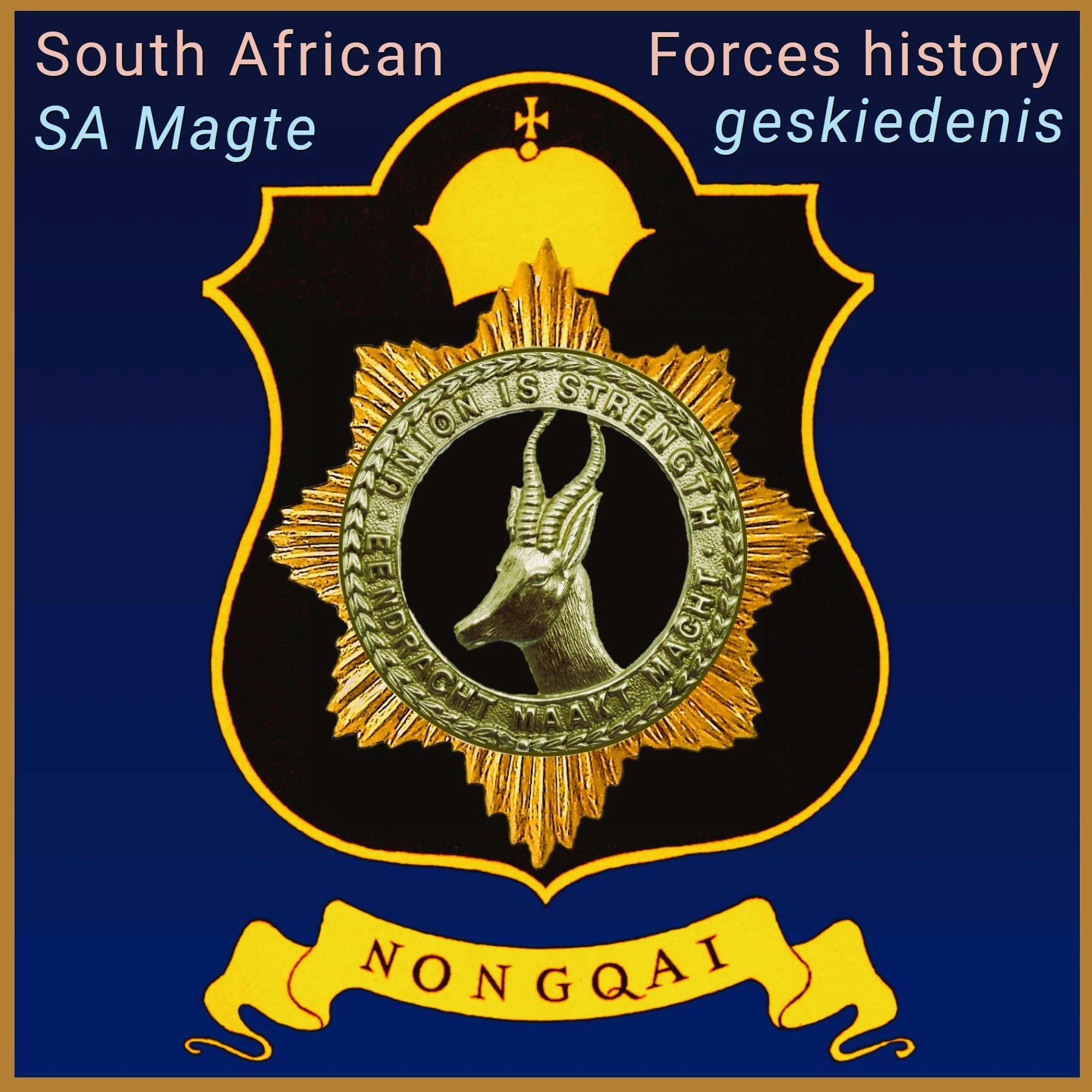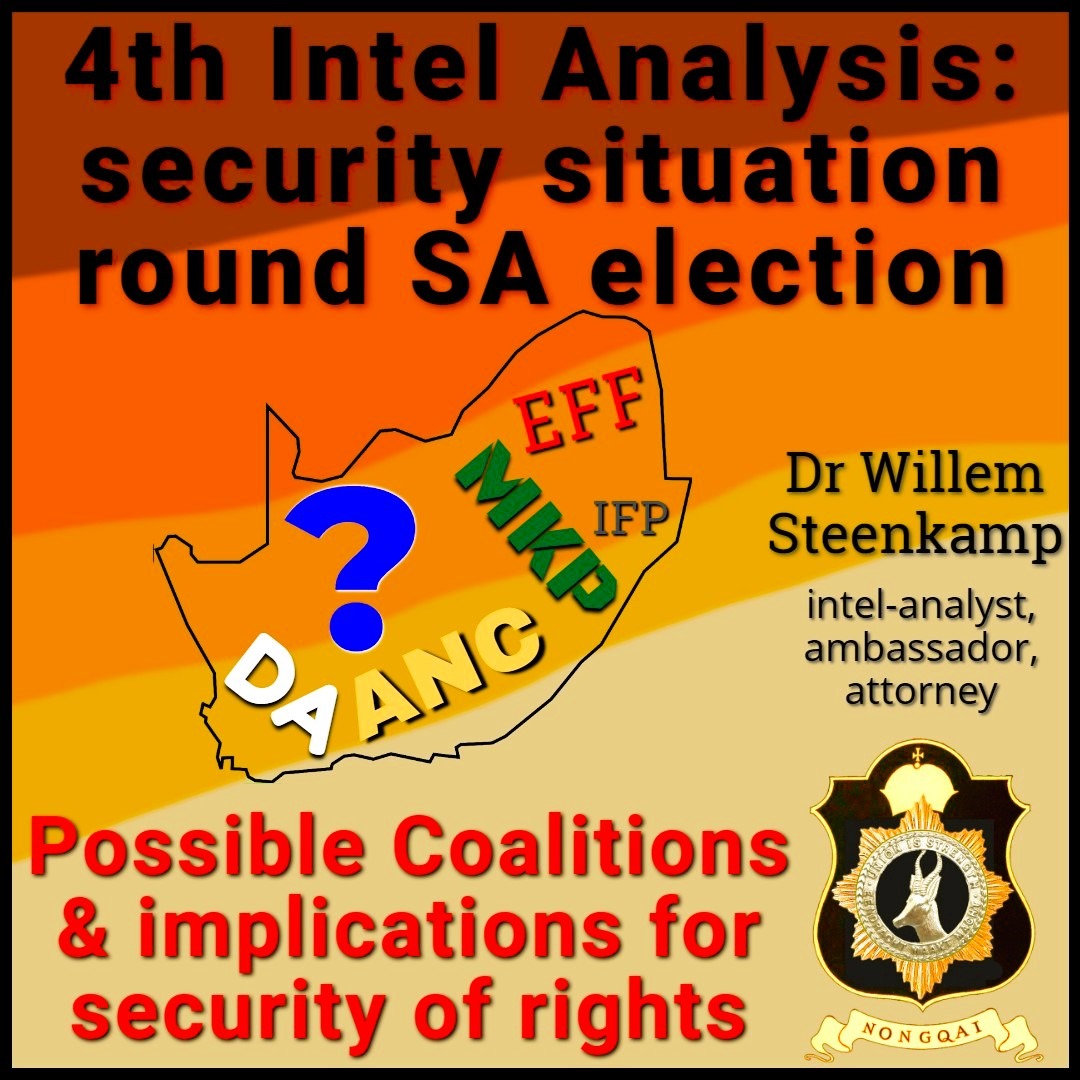ABSTRACT: NONGQAI’s Fourth Analysis of Security Concerns round the 2024 South African Elections with coalition inevitable, assesses the implications of the inevitable need for coalition-building (as obliged by the actual election results, with the ANC far from a majority and also too far away from 50% to be able to govern solely with the aid of small parties). What may this new reality hold for the future security of fundamental rights as found in the current liberal Western style constitution? The strong performance of the Zuma faction within the broader ANC family, could impact both the short-term physical security situation and, much more seriously, the long-term security of property rights as well as the nature of the constitution, plus the rule of law – which would, in turn, affect investor confidence and emigration, and thus the future economic prospects and stability of the nation.
FOCUS KEYWORD: FOURTH ANALYSIS OF SECURITY CONCERNS ROUND THE 2024 SOUTH AFRICAN ELECTIONS WITH COALITION INEVITABLE – WHAT IT MAY HOLD FOR SECURITY OF FUNDAMENTAL RIGHTS
KEYWORDS: South African general election 2024, Cyril Ramaphosa, Jacob Zuma, MK Party, ANC, EFF, DA, property rights, supremacy of the constitution.
AUTHOR: Dr Willem Steenkamp (retired intelligence analyst, ambassador, lawyer, co-editor Nongqai SA Forces History Magazine).
FOURTH ANALYSIS OF SECURITY CONCERNS ROUND THE 2024 SOUTH AFRICAN ELECTIONS: COALITION INEVITABLE – WHAT IT MAY HOLD FOR SECURITY OF FUNDAMENTAL RIGHTS
1. THE PRELIMINARY RESULTS SHOW THAT A COALITION GOVERNMENT WILL NEED TO BE FORMED
The early results of the election and the predictions based there-upon, have it that the ANC will gain somewhere around 41 – 42% of the national vote. This is far from the 50% that the ANC Tripartite Alliance would have needed to continue as a majority government in its own right. It is also clear that the predicted figure does not leave the option for the ANC to form a coalition government simply by means of including the small parties (who have generally done very poorly).
This leaves, mathematically speaking, only the option of going with one or more of the three larger parties – being the mostly white, liberal DA, the EFF (of former ANC Youth League leaders Malema & Shivambu), or the MKP of the ANC’s Zuma faction.
Regarding the rapid rise of the MKP, it is evident that the “moderate” faction in the ANC has once again under-estimated the tactical genius of the Zuma faction, just as former president Thabo Mbeki had done (to his cost) in the run-up to the ANC’s Polokwane elective conference.
That said, it should be understood that the results and the limited choices they leave the ANC Tripartite Alliance, are likely to cause serious internal stress and strains within the ANC (but likely also within the other parties). To assess what the more likely coalition permutations may be, one has to look at the nature of the DA, EFF, and MKP respectively.
2. WHAT DISTINGUISHES THE MKP FROM THE EFF AND THE DA?
The first distinction is that the MKP had purposely not set itself up as a traditional opposition party fighting the ANC (as both the DA and EFF over many years had done). Mr Zuma remains adamant that he is still an ANC member and wishes to remain so – in other words, that the Zuma faction was obliged to form the MKP as essentially a temporary but nevertheless necessary tactical expedient, in order to “purify” and to “bring back” the ANC to its true revolutionary roots. Thus, pretending to want to save the ANC from a leadership that had not truly been part of the former expatriate core who had actually fought the liberation struggle – a new leadership under Mr Ramaphosa, allegedly beholden to White Monopoly Capital and which is said by Zuma to be leading the ANC astray.
What the MKP will be offering the ANC, is effectively to re-unite as “family members” who are at heart both still ANC (proposing to do so under new, purified leadership) and thereby to effectively place the re-unified ANC instantaneously back up to the same comfortable overall majority they had enjoyed in the 2019 election. The price for that, is that the ANC must jettison Mr Ramaphosa and accept a policy platform built around executing the National Democratic Revolution, with priority to “radical economic transformation” and the Africanization of the current constitution (the latter, meaning that parliament should reign supreme and not the constitution).
This is the Zuma strategy referred to as the “Melrose Plan” (which we discussed in our 2nd and 3rd articles in this series – see:
From Article Two you may recall that an important part of the Melrose Plan is the “big reveal” designed to influence the coalition-forming process post-election. What is alleged will be revealed, is further (supposedly damning) proof of serious corruption on the part of Mr Ramaphosa and his inner circle – with, among other things, more about the PhalaPhala scandal.
Unlike the MKP (which had through-out continued to proclaim its undying support for the ANC as such – just opposing the current “deviant” leadership and their policies), both the DA and EFF had from the outset styled themselves as traditional opposition parties, which over the years had been involved in continuing heated dustups with the ANC.
3. “WRONG OPTICS” OF AN ANC/DA COALITION
The DA’s policies are hardly reconcilable with that of the Tripartite Alliance, which has as important member COSATU, the trade union. The DA is also mathematically “too strong”, meaning that their roughly 22% of the seats in the national assembly will far exceed what the ANC needs in order to rule and will give the DA proportionally too much policy leverage (and claim to executive positions).
The strongest argument that’s certain to emerge within the ANC caucus against an ANC/DA coalition, is the all-important optics. Keep in mind that what the MKP has very effectively been blaming the ANC for (as currently configured), is that it is too close to white capital; should the ANC now formally align itself with the DA in a coalition, that will simply re-enforce that image and spell electoral doom for the ANC in future elections. If it had been possible to so effectively portray Mr Ramaphosa as a “stalking horse” for white capital, then forming a coalition with the DA will be portrayed as white capital now sending in its full cavalry to protect their interests…
4. EFF PERCEIVED BY MANY AS TOO RADICAL AND ERRATIC
As regards the EFF, the general opinion among ANC members seem to be that Messrs Malema and Shivambu are simply too erratic, too radical and too attached to unsound economic policies that will likely ruin the country, for the ANC to consider the EFF (on its own) as a coalition partner. The mathematical margins would also be too tight, when combining just the seats of the ANC and EFF (given that some ANC members may elect to not be part of such an overtly radical coalition).
5. THE CONTINUED TENURE OF PRESIDENT RAMAPHOSA
The keys to unlocking an alliance between the Zuma and moderate factions of the broader ANC family, are going to be the position of Mr Ramaphosa and the willingness of the ANC to adopt the policy positions advocated by the Zuma faction regarding the NDR, RET, and Africanization of the constitutional dispensation.
As regards the position of Mr Ramaphosa, one should realise that he always was a compromise candidate who, in the typical manner seen elsewhere in Africa, was elected because he’s from the smallest tribe (the Venda) without an own personal power base. Informed observers are of the opinion that four of the top seven in the ANC leadership have already been working to sideline him.
Being rid of Mr Ramaphosa (who can be blamed for the ANC’s very poor electoral showing, and also be further tainted with corruption by means of the “big reveal”) may seem like a small price to pay for the benefit of a re-united ANC again controlling all the levers of power and privilege.
6. THE POLICY POSITIONS OF THE MKP ARE NOT FOREIGN TO THE ANC
The policy positions of the Zuma faction (such as to press ahead with executing the NDR, Africanising the system, and accelerating economic transformation), have over the years actually all been paid lip service to by the ANC – the moderates had not opposed these postures, just refrained from ardently implementing them. It will thus not be a new language for the ANC caucus to have to adopt, for the sake of a coalition with Zuma.
It should also be remembered that the representative ANC has through-out been quite evenly split between the Zuma and moderate factions, as evidenced by the results of their recent internal elective conferences (which Mr Ramaphosa had won by the skin of his teeth). In other words, there has been and still is a very substantial faction within the ANC who would prefer to go back to the kind of movement which Mr Zuma favours.
Should the ANC “re-unite” in a coalition of itself with the MKP, then it is quite possible that a number of moderates may baulk at being part of that – which may, theoretically, again bring into question if such a coalition will then still have the numbers to constitute a parliamentary majority. In that case, including the EFF would become a necessity – which would lead to South Africa having its most radical government since its democratic transformation in 1994, and which may indeed then seriously threaten fundamental rights such as property ownership and the rule of law.
As regards physical security, the strong showing of the MKP will provide Mr Zuma with the means to mobilise rolling mass action, should he wish to use that as leverage in the coalition horse-trading. Emotions are also sure to run high. Localised unrest can therefore not be ruled out. However, mass action will likely only be a tactic to gain leverage, not a strategy to take over government by force (Mr Zuma understands that an image of dominating Zulu forcefulness may well backfire with other ethnic groups).
What one is most likely to see, is considerable tension and fragmentation within the current ANC about which coalition options to pursue. The ANC has long been fundamentally divided – from the 1950s, through the eighties with the friction between the more moderate Londen and more radical Lusaka wings. The ANC has always been an alliance of factions, held together within a “big tent” by the need for unity in order to gain and maintain power. What is in effect happening now, is that the Lusaka faction (where the ANC’s erstwhile armed wing, uMkohonto weZiswe was headquartered) is in the process of definitively gaining the upper hand.
7. SECURITY THREAT IS NOT SHORT-TERM UNREST, BUT LONG-TERM RIGHTS
As we had predicted in our third article, the gravest threat from a security perspective will not be short-term unrest (akin to that seen in July 2021). Rather, it will be fear about the longer-term future security of fundamental rights such as property and the rule of law – because this will probably impact investor confidence, weaken the Rand (as was immediately seen today when it became clear where the election results were heading), and hamper the economic growth needed to provide jobs and fund public services.
Whereas many had for a long time been wishing for the demise of the ANC government, this result could prove – ironically – that we may be about to have a new government that’s even more dysfunctional, less cohesive, more corrupt, less competent, as well as now ideologically keen to rid our constitutional and legal framework of what is perceived as its Eurocentric characteristics.
This scenario was explained in more detail our third article, and – as set out there – all is not yet necessarily and unavoidably doom and gloom; there are underlying counterweights that could work to maintain stability. That said, it would be totally naïve to under-estimate the harm that some of the coalition options may lead to…
But more about that later, once we have a better idea where the coalition-building is headed. What this short & quick “first take” article was aimed at, is to provide immediate context to what has been transpiring at the ballot box, and to what it may mean for the future, in terms of likely coalitions.
Once the definitive results are available, a follow-up in greater depth will be posted.







